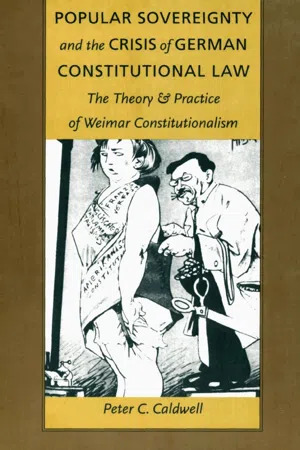
eBook - PDF
Popular Sovereignty and the Crisis of German Constitutional Law
The Theory and Practice of Weimar Constitutionalism
- English
- PDF
- Available on iOS & Android
eBook - PDF
Popular Sovereignty and the Crisis of German Constitutional Law
The Theory and Practice of Weimar Constitutionalism
About this book
Popular Sovereignty and the Crisis of German Constitutional Law is a historical analysis of competing doctrines of constitutional law during the Weimar Republic. It chronicles the creation of a new constitutional jurisprudence both adequate to the needs of a modern welfare state and based on the principle of popular sovereignty. Peter C. Caldwell explores the legal nature of democracy as debated by Weimar's political theorists and constitutional lawyers. Laying the groundwork for questions about constitutional law in today's Federal Republic, this book draws clear and insightful distinctions between strands of positivist and anti-positivist legal thought, and examines their implications for legal and political theory.
Caldwell makes accessible the rich literature in German constitutional thought of the Weimar period, most of which has been unavailable in English until now. On the liberal left, Hugo Preuss and Hans Kelsen defended a concept of democracy that made the constitution sovereign and, in a way, created the "Volk" through constitutional procedure. On the right, Carl Schmitt argued for a substantial notion of the "Volk" that could overrule constitutional procedure in a state of emergency. Rudolf Smend and Heinrich Triepel located in the constitution a set of inviolable values of the political community, while Hermann Heller saw in it a guarantee of substantial social equality. Drawing on the work of these major players from the 1920s, Caldwell reveals the various facets of the impassioned constitutional struggles that permeated German legal and political culture during the Weimar Republic.
Caldwell makes accessible the rich literature in German constitutional thought of the Weimar period, most of which has been unavailable in English until now. On the liberal left, Hugo Preuss and Hans Kelsen defended a concept of democracy that made the constitution sovereign and, in a way, created the "Volk" through constitutional procedure. On the right, Carl Schmitt argued for a substantial notion of the "Volk" that could overrule constitutional procedure in a state of emergency. Rudolf Smend and Heinrich Triepel located in the constitution a set of inviolable values of the political community, while Hermann Heller saw in it a guarantee of substantial social equality. Drawing on the work of these major players from the 1920s, Caldwell reveals the various facets of the impassioned constitutional struggles that permeated German legal and political culture during the Weimar Republic.
Frequently asked questions
Yes, you can cancel anytime from the Subscription tab in your account settings on the Perlego website. Your subscription will stay active until the end of your current billing period. Learn how to cancel your subscription.
No, books cannot be downloaded as external files, such as PDFs, for use outside of Perlego. However, you can download books within the Perlego app for offline reading on mobile or tablet. Learn more here.
Perlego offers two plans: Essential and Complete
- Essential is ideal for learners and professionals who enjoy exploring a wide range of subjects. Access the Essential Library with 800,000+ trusted titles and best-sellers across business, personal growth, and the humanities. Includes unlimited reading time and Standard Read Aloud voice.
- Complete: Perfect for advanced learners and researchers needing full, unrestricted access. Unlock 1.4M+ books across hundreds of subjects, including academic and specialized titles. The Complete Plan also includes advanced features like Premium Read Aloud and Research Assistant.
We are an online textbook subscription service, where you can get access to an entire online library for less than the price of a single book per month. With over 1 million books across 1000+ topics, we’ve got you covered! Learn more here.
Look out for the read-aloud symbol on your next book to see if you can listen to it. The read-aloud tool reads text aloud for you, highlighting the text as it is being read. You can pause it, speed it up and slow it down. Learn more here.
Yes! You can use the Perlego app on both iOS or Android devices to read anytime, anywhere — even offline. Perfect for commutes or when you’re on the go.
Please note we cannot support devices running on iOS 13 and Android 7 or earlier. Learn more about using the app.
Please note we cannot support devices running on iOS 13 and Android 7 or earlier. Learn more about using the app.
Yes, you can access Popular Sovereignty and the Crisis of German Constitutional Law by Peter C. Caldwell in PDF and/or ePUB format, as well as other popular books in History & German History. We have over one million books available in our catalogue for you to explore.
Information
Publisher
Duke University Press BooksYear
1997Print ISBN
9780822319887, 9780822319795eBook ISBN
9780822397656Table of contents
- Contents
- Preface
- Acknowledgments
- The Power of the People and the Rule of Law: The Problem of Constitutional Democracy in the Weimar Republic
- Chapter 1. The Will of the State and the Redemption of the German Nation: Legal Positivisim and Constitutional Monarchism in the German Empire
- Chapter 2. The Purity of Law and Military Dictatorship: Hans Kelsen and Carl Schmitt in the Empire
- Chapter 3. The Radicalism of Constitutional Revolution: Legal Positivism and the Weimar Constitution
- Chapter 4. The Paradoxical Foundations of Constitutional Democracy: Hans Keslen and Carl Schmitt in the Weimar Republic
- Chapter 5. Constitutional Practices and the Immanence of Democratic Sovereignty: Rudolf Smend, Hermann Heller, and the Basic Principles of the Constitution
- Chapter 6. Equality, Property, Emergency: The Constitutional Jurisprudence of the High Courts in the Republic
- Conclusion: The Crisis of Constitutional Democracy
- Notes
- Bibliography
- Index